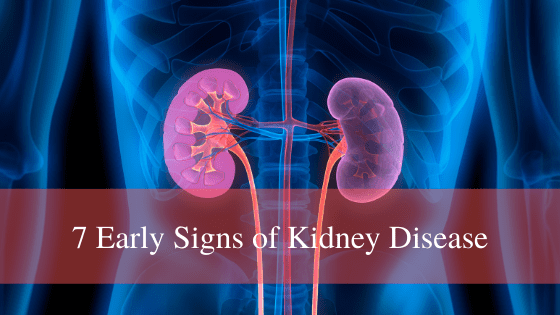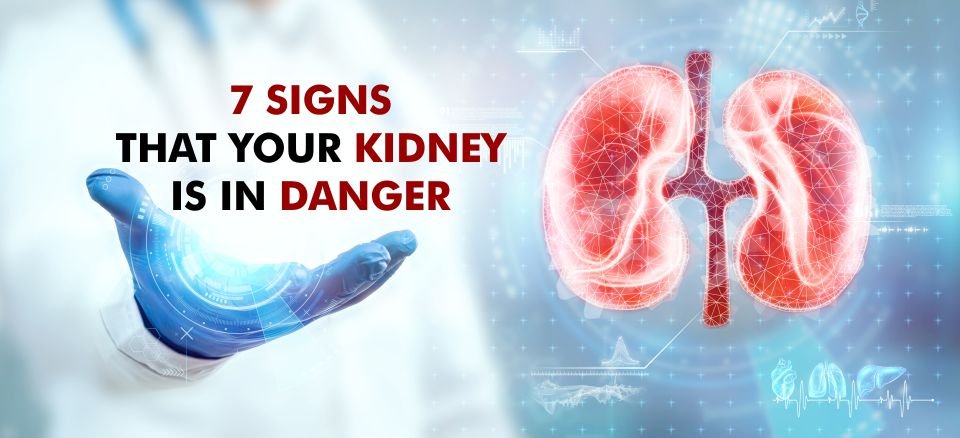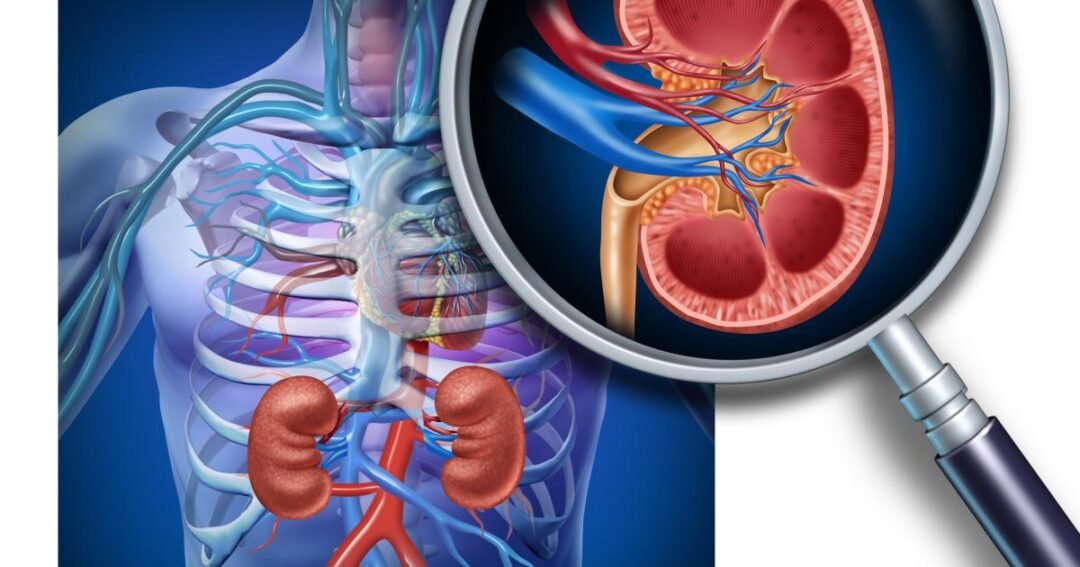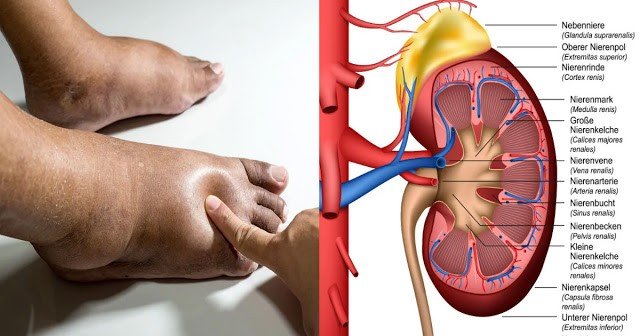Recognizing Kidney Trouble: 7 Signals in your body that indicate your kidney is in trouble
Your kidneys are two bean-shaped organs that filter waste products and extra fluid from your blood. They also help control your blood pressure, make red blood cells, and produce vitamin D. When your kidneys are not working properly, it can cause a variety of problems throughout your body.

Here are some of the signals in your body that indicate your kidney is in trouble:
- Swelling in your feet, ankles, or hands. This is because your kidneys are not removing excess fluid from your body.
- Trouble urinating. You may urinate less often, or you may have pain or burning when you urinate.
- Blood in your urine. This is a serious sign that you need to see a doctor right away.
- High blood pressure. Kidney disease can damage your blood vessels and raise your blood pressure.
- Fatigue. When your kidneys are not working properly, they cannot remove waste products from your blood as efficiently. This can make you feel tired and weak.
- Nausea and vomiting. These symptoms can be caused by high levels of toxins in your blood.
- Shortness of breath. This can be caused by fluid buildup in your lungs.
- Itchy skin. This is a common symptom of kidney disease.
- Muscle cramps. This can be caused by electrolyte imbalances.
- Metallic taste in your mouth. This is a less common symptom of kidney disease.
If you experience any of these symptoms, it is important to see a doctor right away. Kidney disease can be a serious condition, but it can often be treated if it is caught early.
Here are some additional things to watch out for that may indicate kidney problems:
- Rapid weight gain. This can be a sign of fluid retention, which is a common problem in people with kidney disease.
- Bone pain. Kidney disease can lead to bone disease, which can cause pain and make bones more fragile.
- Dizziness. This can be caused by low blood pressure, which is another common problem in people with kidney disease.
- Confusion. This can be a sign of serious kidney problems, such as kidney failure.
If you have any of these symptoms, it is important to see a doctor right away. Early diagnosis and treatment of kidney disease is essential to prevent further damage to your kidneys.

7 Signals in your body that indicate your kidney is in trouble
Our bodies are incredible machines, constantly working to maintain balance and keep us healthy. One crucial organ responsible for this balance is the kidney. The kidneys play a vital role in filtering waste and excess fluids from our blood, regulating blood pressure, and producing essential hormones. However, when the kidneys are in trouble, they send signals that we need to pay attention to. In this article, we will explore the signs and signals your body may exhibit when your kidneys are not functioning optimally.
Understanding the Kidneys
Before diving into the signals of kidney trouble, let’s briefly understand the functions of these remarkable organs.
What do the kidneys do?
The kidneys are bean-shaped organs located in the lower back. They have several key functions, including:
1. Filtration of Blood
The primary function of the kidneys is to filter waste and excess fluids from the bloodstream to form urine.
2. Regulation of Blood Pressure
Kidneys help regulate blood pressure by controlling the volume of blood and the levels of sodium and water in the body.
3. Red Blood Cell Production
Erythropoietin, a hormone produced by the kidneys, stimulates the bone marrow to produce red blood cells.
4. Acid-Base Balance
The kidneys maintain the body’s acid-base balance, ensuring it remains within a healthy range.

Recognising Kidney Trouble
Now that we understand what the kidneys do, let’s explore the signals your body may give when they are in trouble.
1. Changes in Urination
One of the most common signs of kidney trouble is changes in urination patterns. These changes can include:
a. Frequent Urination
If you find yourself needing to urinate more often, especially at night, it could indicate kidney issues.
b. Blood in Urine
The presence of blood in your urine, known as hematuria, should never be ignored and may signal kidney problems.
2. Swelling and Fluid Retention
When the kidneys aren’t effectively removing excess fluids, you may notice swelling, particularly in the ankles, feet, and hands. This condition is called edema.
3. Fatigue and Weakness
Kidney problems can lead to anemia, causing fatigue and weakness due to a lack of red blood cells.
4. High Blood Pressure
Uncontrolled high blood pressure is both a cause and a symptom of kidney trouble. It’s essential to monitor and manage your blood pressure.
5. Back Pain
Persistent back pain, especially in the kidney area, could indicate kidney stones or an infection.
6. Changes in Skin Color
Kidney dysfunction can lead to changes in skin color, making it appear pale or yellowish.
7. Metallic Taste in Mouth
An unusual metallic taste in your mouth can be a sign of kidney problems, as waste products build up in the bloodstream.
Conclusion
Our kidneys are vital for maintaining our overall health, and they communicate with us through various signals when they are in trouble. Recognizing these signals early on can make a significant difference in preventing and managing kidney issues. If you experience any of the symptoms mentioned in this article, it’s crucial to consult a healthcare professional for a proper diagnosis and treatment.

Improving your kidney health is essential for maintaining overall well-being.
The kidneys play a crucial role in filtering waste and excess fluids from your blood, regulating blood pressure, and producing essential hormones. Here are some key steps to help you enhance and maintain your kidney health:
Stay Hydrated:
- Drinking an adequate amount of water is vital for kidney function. It helps flush out toxins and ensures your kidneys have enough fluid to perform their filtration duties.
Eat a Balanced Diet:
- A kidney-friendly diet includes plenty of fresh fruits and vegetables. These provide essential vitamins and minerals while being low in sodium, which can help maintain healthy blood pressure.
Limit Sodium Intake:
- High sodium intake can lead to high blood pressure and strain on your kidneys. Reduce your salt intake by avoiding processed foods and using herbs and spices for flavor.
Control Blood Sugar:
- If you have diabetes, keeping your blood sugar levels in check is crucial. High blood sugar can damage the small blood vessels in your kidneys, leading to kidney disease.
Monitor Blood Pressure:
- High blood pressure is a leading cause of kidney damage. Regularly monitor your blood pressure and work with your healthcare provider to keep it within a healthy range.
Maintain a Healthy Weight:
- Excess weight can increase your risk of kidney disease. Achieving and maintaining a healthy weight through diet and exercise can have a positive impact on your kidney health.
Limit Alcohol Consumption:
- Excessive alcohol consumption can put additional stress on your kidneys. If you choose to drink, do so in moderation.
Quit Smoking:
- Smoking can damage blood vessels and reduce blood flow to the kidneys, increasing the risk of kidney disease. Seek support to quit smoking if needed.
Manage Stress:
- Chronic stress can contribute to high blood pressure and other health problems that affect your kidneys.
Find healthy ways to manage stress, such as exercise, meditation, or counseling.
- Avoid Overuse of Over-the-Counter Pain Medications:
- Non-prescription pain relievers, such as ibuprofen and aspirin, can harm your kidneys if used excessively. Consult your doctor for safer alternatives for pain management.
- Get Regular Exercise:
- Regular physical activity promotes overall health and can help control weight, blood pressure, and blood sugar levels, all of which benefit your kidneys.
- Limit Phosphorus Intake:
- If you have kidney disease, it’s essential to limit phosphorus intake by avoiding high-phosphorus foods like soda, processed meats, and dairy products.
- Follow Medical Advice:
- If you have underlying medical conditions, such as hypertension or diabetes, follow your healthcare provider’s recommendations closely to manage these conditions effectively.
- Regular Check-ups:
- Schedule regular check-ups with your healthcare provider. They can monitor your kidney function and detect any issues early on.
- Stay Informed:
- Educate yourself about kidney health and be aware of the risk factors. Knowledge is a powerful tool for prevention.
By adopting these habits and making kidney health a priority, you can significantly reduce the risk of kidney problems and enjoy a healthier life. If you have concerns about your kidney health, consult a healthcare professional for personalized guidance and care.

Who is at risk of kidney problems?
Kidney problems can affect anyone, but certain factors can increase the risk of developing kidney issues. It’s essential to be aware of these risk factors and take preventive measures when necessary. Here are some groups of people who are at a higher risk of kidney problems:
Individuals with Diabetes:
- Diabetes is a leading cause of kidney disease. High blood sugar levels can damage the small blood vessels in the kidneys over time, leading to kidney problems. People with diabetes should closely monitor their blood sugar levels and manage their condition effectively to reduce the risk.
People with High Blood Pressure (Hypertension):
- High blood pressure is a significant risk factor for kidney disease. Uncontrolled hypertension can damage the blood vessels in the kidneys, reducing their ability to filter blood effectively. Regular blood pressure monitoring and management are essential.
Family History of Kidney Disease:
- If you have a family history of kidney disease, you may be at a higher risk. Some kidney conditions have a genetic component, so it’s crucial to be vigilant and get regular check-ups if you have a family history of kidney problems.
Age:
- The risk of kidney disease tends to increase with age. As you get older, your kidney function may naturally decline. Regular health check-ups become more important as you age to monitor your kidney function.
Certain Ethnicities:
- Some ethnic groups, such as African Americans, Hispanics, and Native Americans, have a higher risk of kidney disease compared to others. The reasons for these disparities are complex and may involve genetic, lifestyle, and socioeconomic factors.
Obesity:
- Excess body weight, especially obesity, can increase the risk of kidney disease. Obesity is often associated with conditions like diabetes and high blood pressure, which are known risk factors for kidney problems.
Smoking:
- Smoking can harm blood vessels and reduce blood flow to the kidneys, increasing the risk of kidney disease. Quitting smoking is beneficial for overall kidney health.
Use of Certain Medications:
- Overuse or prolonged use of non-prescription pain relievers like ibuprofen and aspirin can damage the kidneys. It’s essential to follow the recommended dosage guidelines and consult a healthcare provider if you have concerns.
Previous Kidney Issues:
- If you’ve had kidney stones, kidney infections, or any other kidney-related problems in the past, you may be at a higher risk of future kidney issues.
- Autoimmune Diseases:
- Autoimmune diseases like lupus and rheumatoid arthritis can affect the kidneys. Proper management of these conditions and regular monitoring are essential.
- Urinary Tract Infections (UTIs):
- Repeated or severe UTIs can potentially lead to kidney infections if left untreated. Prompt treatment of UTIs is crucial to prevent complications.
- Exposure to Environmental Toxins:
- Certain occupational exposures or environmental toxins may increase the risk of kidney problems. This risk is often specific to certain industries or regions.
It’s important to note that while these risk factors can increase the likelihood of kidney issues, they do not guarantee that you will develop kidney disease. Taking proactive steps, such as maintaining a healthy lifestyle, managing underlying health conditions, and seeking regular medical check-ups, can help reduce your risk and promote kidney health. If you fall into any of these high-risk categories, consult a healthcare professional for personalized guidance and care.
Maintaining a healthy diet is crucial for supporting kidney health.
A well-balanced diet can help reduce the risk of kidney problems and support optimal kidney function. Here are some key nutritional guidelines for kidney health:
Control Sodium Intake:
- Limiting sodium (salt) intake is essential for kidney health. Excess sodium can increase blood pressure and strain the kidneys. Aim to consume less than 2,300 milligrams (about one teaspoon of salt) per day.
Choose Fresh Fruits and Vegetables:
- Fresh fruits and vegetables are rich in essential vitamins and minerals and are naturally low in sodium. They also provide antioxidants that can help protect the kidneys from damage.
Monitor Phosphorus:
- If you have kidney disease, it’s important to limit phosphorus intake. High phosphorus levels can weaken bones and lead to cardiovascular issues. Avoid high-phosphorus foods like soda, processed meats, and dairy products.
Moderate Protein Intake:
- Consuming an appropriate amount of protein is essential, but excessive protein intake can strain the kidneys. Consult with a healthcare provider or dietitian to determine the right protein level for your individual needs.
Control Potassium:
- If you have kidney problems, you may need to monitor potassium intake. High potassium levels can affect heart function. Foods rich in potassium include bananas, oranges, and potatoes. Your healthcare provider can help you manage potassium intake.
Limit Phosphorus-Containing Beverages:
- Beverages like dark-colored sodas and certain sports drinks can be high in phosphorus additives. It’s best to avoid these or choose low-phosphorus alternatives.
Stay Hydrated:
- Proper hydration is crucial for kidney function. Drinking enough water helps the kidneys flush out waste products. Consult your healthcare provider for personalized hydration recommendations.
Control Portion Sizes:
- Pay attention to portion sizes to avoid overeating. This can help manage calorie intake and prevent excess weight gain, which is beneficial for kidney health.
Choose Healthy Fats:
- Opt for unsaturated fats found in foods like olive oil, avocados, and nuts. These fats are heart-healthy and can support overall health, including kidney health.
- Limit Added Sugars:
- Excessive sugar consumption can contribute to obesity and diabetes, which are risk factors for kidney disease. Minimize your intake of sugary foods and beverages.
- Monitor Calcium Intake:
- Calcium is essential for bone health, but excessive calcium intake can contribute to the formation of kidney stones. Talk to your healthcare provider about appropriate calcium levels for your diet.
- Manage Blood Pressure and Blood Sugar:
- Keeping your blood pressure and blood sugar levels within a healthy range is vital for kidney health. Follow your healthcare provider’s recommendations and take prescribed medications as directed.
- Limit Alcohol:
- Excessive alcohol consumption can harm the kidneys and increase the risk of kidney disease. If you choose to drink, do so in moderation.
- Consult a Dietitian:
- If you have kidney disease or specific dietary restrictions, consider working with a registered dietitian. They can create a personalized meal plan tailored to your needs and preferences.
Remember that individual dietary needs vary, and it’s essential to consult with a healthcare provider or dietitian for personalized recommendations, especially if you have kidney disease or related conditions. By following these guidelines and making informed food choices, you can support your kidney health and overall well-being.
FAQs
Q1: Can kidney trouble be prevented?
A1: Yes, you can reduce the risk of kidney trouble by staying hydrated, maintaining a healthy diet, and managing underlying health conditions like diabetes and hypertension.
Q2: What are some dietary changes to support kidney health?
A2: A diet low in sodium, processed foods, and excessive protein can help support kidney health. Consult a nutritionist for personalized recommendations.
Q3: Are kidney problems hereditary?
A3: Some kidney conditions have a genetic component, so if there is a family history of kidney disease, it’s essential to be vigilant and get regular check-ups.
Q4: Can kidney trouble be reversed?
A4: The extent to which kidney trouble can be reversed depends on the underlying cause and how early it’s detected. Timely intervention and lifestyle changes can often help improve kidney function.
Q5: How often should I get my kidney function checked?
A5: It’s advisable to discuss the frequency of kidney function tests with your healthcare provider based on your individual risk factors and health history.
The Magic of Waking Up at 3 AM: Exploring Early Morning Routines, What is the Miracle Morning rule?
https://www.health.com/condition/kidney-disease/signs-of-kidney-disease

